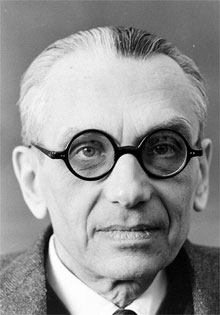
Gödel
Kurt Friedrich Gödel (28 April 1906 – 14 Jan 1978) was a mathematician and logician who proved theorems on the predicate calculus created by Frege and on provability in formal logic systems of unprecedented scope and significance. His completeness theorem of 1929 proved that any logical truth that can be stated in the predicate calculus is provable by the axioms of deduction. His incompleteness theorem of 1931, in contrast, proved that no finitely or recursively enumerable axiom system that is consistent, and strong enough to include arithmetic, can be complete: there must exist true theorems in arithmetic that cannot be proved in it. In a second incompleteness theorem proved shortly afterwards he showed that the consistency of such a theory is also unprovable.
Gödel also found a class of solutions to Einstein’s general theory of relativity (GTR) according to which the universe as a whole rotates (the so-called Gödel universe). In such a universe there exist closed timelike curves, whereby an object evolves in time into its own past. No such universe admits a global time function, i.e. there do not exist global 3-dimensional hypersurfaces all of whose points are spacelike related to each other. Gödel argued that this showed that ‘essential’ properties of time were not built into our best fundamental laws of space and time, and that therefore time in this sense is illusory.
He was a Platonist: according to Gödel, not only do abstract objects exist, but the human mind can be in contact with them.
Gödel was born in Brünn, in Austria-Hungary (now Brno, in the Czech Republic), where he attended the Evangelische Volksschule. He entered the University of Vienna in 1924, intending to study physics. There he attended meetings of the Vienna Circle. He was eventually awarded a doctorate in 1929 under the supervision of Hans Hahn; his thesis contained his completeness theorem for the predicate calculus.
Links
Stanford Encyclopedia of Philosophy >
Multimedia
In Our Time: Gödel’s incompleteness theorems >
